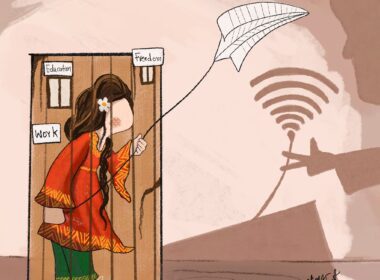The Kind of Feminism Afghan Women Need
By Nigin

Nigin (a pen name) is an artist and activist I have come to know over the past year. In that time, I have witnessed her fearless defiance as she speaks out against a terrorist regime, her relentless drive to uplift the women around her, and her unflinching honesty both in our conversations and in her online presence. Recently, during one of our online conversations, she expressed her frustration about the lack of understanding people have about what Afghan women living inside the country are going through and how they can be helped. I, in return, asked her to write down her thoughts so we could share her perspective on this issue. This essay is stitched together from text and voice messages Nigin sent me. Though I have arranged the paragraphs, every word, sentence and thought remains her own.
Shikha Sawhney Lamba
In today’s world, it’s more important than ever to understand the true meaning of feminism. Feminism is not about superiority or division; it is a global movement for equal rights, safety, and dignity for all women. It is about ensuring that women everywhere can live in security, speak freely, and be recognized as equal human beings alongside men.
However, applying the ideals of feminism in Muslim-majority countries like Afghanistan comes with deep complexities. Here, the reality is shaped by decades of conflict, a patriarchal culture, and the influence of religious extremism. Afghan women are not just fighting for equality; they are fighting for survival. They are resisting both the brutal control of the Taliban, the world powers that support them, and the silence of the world.
For Afghan women, the path to liberation looks different. It’s not about revealing our bodies, it’s about reclaiming safety, dignity, and the right to be heard. You can’t ask a woman to fight dress codes when her life is in danger. True empowerment begins with safety and respect.
In deeply conservative societies, blending feminism with resistance to radical ideologies is complex. Replacing one extreme with another won’t bring real change. Progress must come through empathy, through well-thought-out, smartly executed plans, not confrontation.
If you want to know how to help Afghan women, speak to the ones living in the country. What do they want? How do they want to live? What kind of support do they need? In the past four years, many efforts could have supported Afghan women’s empowerment, but unfortunately, they didn’t succeed. To truly help, we must first prioritise women’s safety and their own demands. Then, we must find ways to strengthen anti-Taliban narratives and support women who are working to raise awareness among others. Four years of darkness have led many women to give up their rights. It’s time to identify and support those who are still resisting, especially those leading intellectual and ideological resistance against the Taliban.
I understand the matter of trust is a big one. Especially in terms of money, people are always wondering whom they can trust. People need to closely observe the Afghan women in their communities in the diaspora. If you are unsure about whom to trust within Afghanistan, take the clues from Afghans you trust and have observed over time in the diaspora. There are many Afghan women who, after leaving the country, focus on just building their lives and promoting their work. While there is nothing wrong with that, look for those who are advocating and working for the women left behind. Look for the women who advocate for Afghan women without the fanfare and the glamour. Some of these activists keep calling for the opening of schools, through the recognition of the Taliban, as if they believe closing schools is the only crime they have committed. As these people keep bringing people’s focus to just one issue, the Taliban is busy destroying Afghanistan in many different ways.
Stop following the Taliban lobbyists. Stop following the YouTubers, influencers, etc who support the Taliban in any way, and don’t amplify their voices. People get brainwashed by influencers who have a high number of followers, who have been funded by individuals living outside of the country. These influencers are trying to tell people that the Taliban has changed. Check their backgrounds, check their social media, they are quite obvious in the way they support this regime. There are Afghan celebrities with large social media followings who are Taliban supporters. Look up their history, it’s there on the internet. So many of us living inside the country who know the truth, comment under posts and share in our Instagram stories about the so-called “activists” who are in fact working for the Taliban in one way or another. Women inside the country are telling you who cannot be trusted – observe and listen.
People often avoid speaking directly about the reality of the Taliban. The Taliban of today are grown-up children of twenty years of foreign aid; they didn’t just fall from the sky. There should be thoughtful methods in place to reveal the truth indirectly, especially in remote areas without putting anyone at risk. There are so many women who want to expose the regime’s hand in the increasing number of child marriages, rape of girls and boys, and forced marriage to Taliban members. They need tools like microphones and cameras to document, they need secure channels to share their findings without it being traced back to them and their families. To expose the truth and document evidence against the Taliban, women must be supported so the world can truly understand what is happening. Revealing these realities may be dangerous, but for many, it is not just a risk, it is a responsibility. And many of us have taken on this responsibility and have been risking our lives for the past four years.
Feminist groups outside Afghanistan should work towards establishing a direct connection with women activists living in Afghanistan, providing them with support. These groups should support Afghan activists on social media, allowing pseudonyms, allowing them to raise awareness, share stories, and resist safely without revealing their identity. For example, they can create YouTube channels and share the links with women inside the country, where they can post information through the internet. Help these women give voice to all those who are being silenced. If each province could have a support group for sharing, educating and supporting, led by an Afghan woman living there, it would be very helpful. There are many women risking their lives fighting for women’s rights within Afghanistan; these women, you know, you can trust.
The fight also doesn’t always need to be loud; sometimes it’s through awareness. Help us get more educational materials for the population. Help us teach women and families not to get brainwashed by the Taliban. There must be efforts to reduce childbirth in these conditions. Mothers need to be made aware that bringing a child into a world under such hardship is not the right decision.
Aid, while needed and appreciated, is not a long-term solution. Even if food aid continues for the next hundred years, it will never be enough. We don’t want our country to be dependent on aid. We want the freedom to work, to earn for ourselves. These are survival strategies, not solutions for eliminating the Taliban. While I respect everyone who is helping Afghan women, giving food to women often makes them feel helpless, but giving them motivation and building their capacity gives them dignity and self-respect.
Feminism takes many forms. For Afghan women, it’s in the courage to go to school, speak up, and keep hoping. For us, feminism is resistance against the Taliban. Let’s not reduce feminism to one image or one way of being. Afghan women need the right voices amplified – we need voices of women who are fighting for all of us to be supported so that they can inspire more women to stand up against this regime.
Nigin (pen name) is an artist and feminist living in Afghanistan.
You can follow her on Instagram – https://www.instagram.com/nigin369t/




